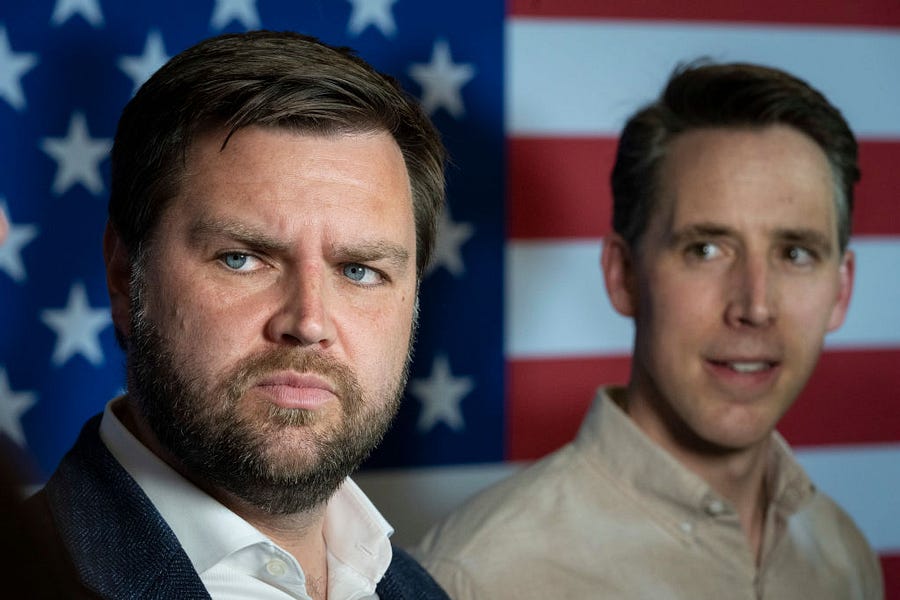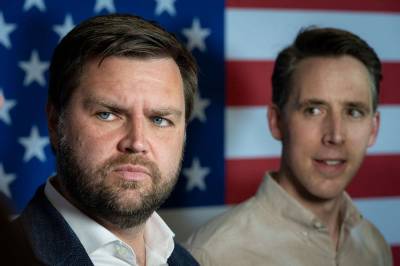One of the core components of a populist’s view is that things are the way they are—bad, unfair, and getting worse—because they won’t let us have the good things and live the good life.
Who they are depends on your flavor of populism. If you’re a right-wing cultural populist, they are likely to be individuals and institutions in education, entertainment, corporate America, and the news media whom you see undermining traditional values, imposing woke pieties, and obliterating the existing culture through immigration and anti-white policies. If you’re a left-wing cultural populist, they are individuals and institutions whom you see imposing racist and sexist modes from their positions in law enforcement, business, popular culture, and religion in order to deny non-males and oppressed minorities their due. If you are an economic populist, they are bankers and plutocrats who hoard money that could otherwise alleviate the suffering of the poor.
In every case, the premise is that we, the virtuous and afflicted people, are being kept from our natural place of prosperity and prominence by them, the selfish ones who are keeping it from us. This is why populism and authoritarianism are so closely linked. One of the most valuable deceptions of the strongman is to say that the only reason we don’t have the things we want—endless prosperity, military dominance, the eradication of crime, the correct social order, etc.—is that the people in power are too weak to do the hard and unpleasant things necessary to deliver the good life … at least for us.
Whether it’s Hugo Chavez, Elizabeth Warren, Viktor Orbán, or Josh Hawley, a necessary idea is that the bad people have the means to allow us to be happy and live the good life, but will not allow it to happen for their own reasons—selfishness or maybe just spite. It isn’t that the people who disagree with you are sincerely mistaken, even that they see the world much as you do from the opposite direction. It is that they are wicked and need a powerful force to end their reign.
“We are truly fighting pure evil right now,” said Arizona’s Republican gubernatorial nominee Kari Lake. “It is evil, what we’re dealing with in this world. It’s coming from the left, it’s coming from their spokespeople in the media, we all know it.”
I don’t doubt the sincerity of her hatreds, but imagine what kind of a worldview would be necessary to believe that the way to fight “pure evil” would be by electing someone to be governor of Arizona. When Rep. Ilhan Omar, a Minnesota Democrat, called an opponent of President Biden’s student-loan forgiveness program “a miserable little weasel” and “Lucifer in the flesh,” I’m sure she meant it. But if Satan himself were on the case, I doubt he would be looking to team up with state attorneys general to file a lawsuit.
I’ve long been aware of the advantages for populists of grandiose descriptions of their enemies. Those seeking extraordinary powers need extraordinary foes: people so iniquitous that they have it in their power to give peace and prosperity but deny it. The way you hype up a mob to smash in the windows of the Capitol is by first making the mob’s members believe that somehow the mostly unimpressive bunch of strivers with oversized lapel pins in the building had the power to do the right thing, but chose not to. Not wrong, but evil. Not cogs in a machine, but wielders of great power.
What I had missed before, though, was the utopianism beneath the surface of right-wing populism.
Progressive populism is almost expressly utopian. The story goes like this: If humans have a nature at all, it is overwhelmed by the conditions of one’s birth and experiences. People do bad things because bad things have been done to them, because of bigoted, classist, or sexist constucts that opress them. Crime, poverty, and ill health are the results of external forces. If we could provide a reasonable income and services for people, in time, the maladies of the past 100,000 years would fade away. Shiny, happy people holding hands. Even a passing familiarity with people, though, would defeat this thinking. Our nature is such that even if it were possible to concentrate wealth and power in such huge quantities to obliterate the existing barriers for all people, we would abuse those powers and build new, more nightmarish tyrannies.
But I hadn’t thought enough about right-wing utopianism, since nationalism and its populist expressions are almost always reactionary. It was not until I got into the book from Matthew Rose, A World After Liberalism: Philosophers of the Radical Right, that I started to think about that other parallel in populism. I first heard Rose, a conservative who talks and thinks like a theologian, interviewed by Andrew Sullivan on Sullivan’s podcast, The Dishcast. A first-rate intellectual historian, Rose is more than up front to the laments about post-Enlightenment Western civilization:
“In theory, liberalism proposes a neutral vision of human nature, cleansed of historical residues and free of ideological distortions. In reality, it promotes a bourgeois view of life, placing a higher value on acquisition than virtue,” he writes. “In theory, liberalism makes politics more peaceful by focusing on the mundane rather than the metaphysical. In reality, it makes political life chaotic by splintering communities into rival factions and parties.”
But in his biographies of five intellectual fathers of the current American nationalism—Oswald Spengler, Julius Evola, Francis Parker Yockey, Alain de Benoist, and Sam Francis—Rose shows how their yearnings for a pre-Christian, authentic civilization is a utopianism just as powerful as the futuristic paradise imagined by progressives. Like the Southern Agrarian movement of the 1930s, they yearned for a time that had never really existed, a sort of militant nostalgia. The desire from the new nationalists today is deeply rooted to the appealing but mistaken belief in a “before time,” that once things had been good and orderly but that outside forces, including the teachings and ministry of Jesus of Nazareth, ruined the good life.
Right-wing utopianism holds that if enough power can be placed in the right hands, human nature can be overcome, and men and women will be forced, to their benefit, into the correct communal settings where they can prosper and avoid the chaotic splintering of modernity.
One utopia is not more ridiculous than the other. Both are easy to see in their falsity if one understands, even a little, the ways in which power is, has been, and always will be abused. But to understand our political moment, it is important to hear Rose’s message from the past century or so. Right-wing populism is just as attached to Utopianism as its left-wing counterpart. But one is an imaginary past, while the other is an imaginary future.







Please note that we at The Dispatch hold ourselves, our work, and our commenters to a higher standard than other places on the internet. We welcome comments that foster genuine debate or discussion—including comments critical of us or our work—but responses that include ad hominem attacks on fellow Dispatch members or are intended to stoke fear and anger may be moderated.
With your membership, you only have the ability to comment on The Morning Dispatch articles. Consider upgrading to join the conversation everywhere.